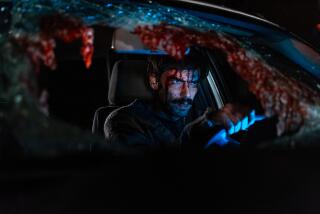Real Life From Daily Struggles to War’s Tensions
- Share via
This month’s releases of golden oldies include the restored version of Robert Flaherty’s landmark silent documentary “Nanook of the North,” Frank Capra’s Oscar-winning World War II documentary series “Why We Fight” and some rather anemic horror films from Universal.
Though Flaherty’s “Nanook of the North,” released in 1922, is considered one of the seminal documentaries ever made, most prints available have been in horrible condition. “Nanook” was a shadow of its former self.
That’s not the case with Kino’s re-release ($25), which has been painstakingly restored by David Shepard. “Nanook” is now 79 minutes in length, 15 minutes longer than any previous available version. The end result is a mesmerizing, beautifully realized story of an Eskimo family’s struggle for survival in the Hudson Bay region of Canada.
Shot by the explorer and filmmaker in 1920, after spending 10 years in the region, “Nanook” is replete with exciting action and high drama as the hunter and his family desperately search for food. Sadly, Nanook died of starvation two years after the film was completed.
This “director’s cut” restores all the footage that was edited out of the 1946 reissue and features the subtle color tinting Flaherty used. The projection speed now conforms to the speed of the original film. Thanks to digital restoration, the flecks and dirt have been cleaned up. Timothy Brock, using the original score’s breakdown and nine of the original cues, has written a remarkable score.
Kino has also released “Before the Nickelodeon” ($50), Charles Musser’s 1982 tribute to director Edwin S. Porter of “The Great Train Robbery” fame.
Also new from Kino is Sergei Eisenstein’s documentary on the history of Mexico and its people, “Que Viva Mexico!” ($25). Eisenstein began the documentary in 1931, but financial difficulties made it impossible for him to complete the film. In 1979, MosFilm in Moscow and Eisenstein’s then-80-year-old editor used Eisenstein’s notes to complete the film.
To order any Kino video: (800) 562-3330.
More World War II: There has been tremendous renewed interest in World War II with the success of “Saving Private Ryan.” If “Ryan” whet your appetite to learn more about the global conflict, check out Rhino Home Video’s seven-volume set “Why We Fight” ($40). This documentary series, produced during World War II and directed by Frank Capra, features seven incredibly compelling films that were used as propaganda to show Americans the real threat of the Axis powers and the need for the U.S. to enter the war.
Capra, then a major in the U.S. Army Signal Corps, enlisted the talents of Walt Disney and facilities at MGM, Paramount and 20th Century Fox to make the Oscar-winning documentaries, which every new enlistee was required to watch.
To order: (800) 432-0020.
Horrors: On Tuesday, Universal will add four more installments ($15 each) to its “Classic Horror Collection.” The films, though, are far from classics.
The best of the lot is 1941’s fun comedy thriller “The Black Cat,” which stars Basil Rathbone, Gale Sondergaard, Bela Lugosi, Broderick Crawford, Gladys Cooper and a very young Alan Ladd. Stanley Cortez supplied the terrific black-and-white, moody cinematography.
June Lockhart played opposite the most famous collie in history, Lassie, on the small screen. But in 1944’s “She Wolf of London,” she actually scares dogs. She plays a wealthy orphan who believes she is a werewolf. It’s all pretty silly, but horror fans may get a kick out of it. Don Porter, a.k.a. Gidget’s dad, and Sara Haden also star.
Strictly for the undiscerning is 1944’s “Jungle Woman,” a bit of hooey about a doctor and a strange woman who transforms herself into an ape woman.
Even worse is 1945’s “Jungle Captive,” a threadbare shocker about a mad biochemist who tries to bring an ape woman back to life.
More to Read
Only good movies
Get the Indie Focus newsletter, Mark Olsen's weekly guide to the world of cinema.
You may occasionally receive promotional content from the Los Angeles Times.











